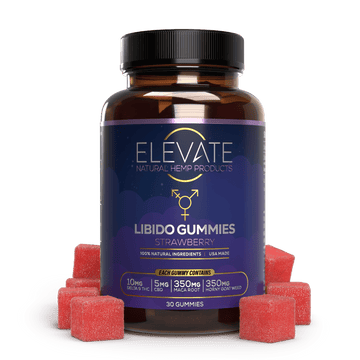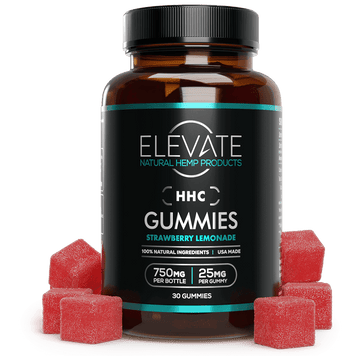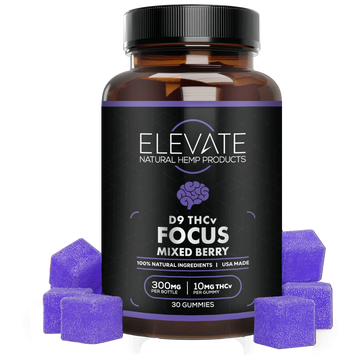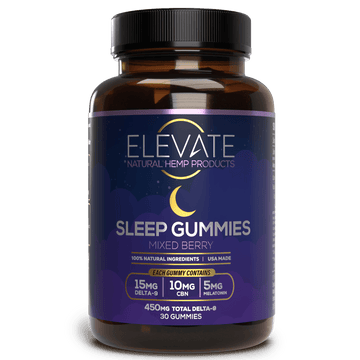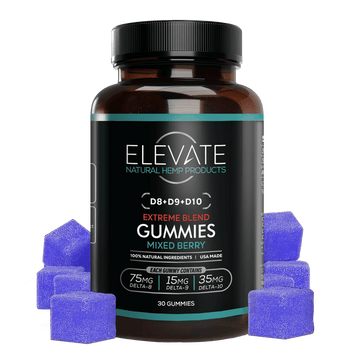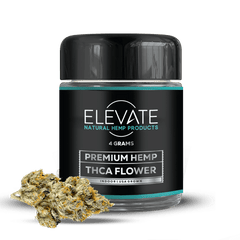You've probably heard plenty about delta-8 and delta-9 THC. But the cannabis conversation is getting much bigger, and two compounds are now stepping into the spotlight: THCA and THCP. Think of them as total opposites. One is a true powerhouse, delivering an intensely potent experience. The other is its non-psychoactive raw form, explored for its potential wellness benefits without the high. Getting to know the unique roles of the cannabinoid THCA THCP pair is the first step to choosing the right product for you.
THCA, known for its potential therapeutic benefits without psychoactive effects, and THCP, recognized for its extraordinary potency, are sparking curiosity among researchers and consumers alike. This blog will delve into the distinctive qualities of THCA and THCP, offering insights into their effects, benefits, and how they might complement each other in the world of cannabis innovation.
So, What Exactly Is the Cannabinoid THCP?
THCP, or tetrahydrocannabiphorol, is a naturally occurring cannabinoid found in cannabis that has recently come to light due to its potent effects. Structurally similar to THC, the primary psychoactive component in cannabis, THCP contains a longer alkyl side chain, which significantly enhances its affinity for CB1 receptors in the brain.
This molecular characteristic suggests that THCP could be substantially more potent than THC, potentially offering more pronounced therapeutic and psychoactive effects. Initial research indicates that THCP might intensify the typical effects of THC, such as euphoria, relaxation, and potential pain relief, but more studies are needed to fully understand its properties and implications for medical and recreational use.
A Recent Discovery with a Unique Structure
What really sets THCP apart is its molecular makeup. It features a longer alkyl side chain with seven carbon atoms, while the more common Delta-9 THC only has five. This might sound like a small detail, but it's a game-changer. This unique structure allows THCP to connect with the body's cannabinoid receptors far more effectively. In fact, some research suggests it can bind to our CB1 receptors up to 33 times more efficiently than Delta-9 THC. Because of this supercharged connection, early studies indicate THCP could be much stronger, producing a powerful and stimulating experience. The effects are often compared to Delta-9, just significantly more intense.
And What About the Cannabinoid THCA?
THCA, or tetrahydrocannabinolic acid, non-psychoactive cannabinoids found primarily in raw and live cannabis. As the precursor to THC, THCA converts into THC through a process called decarboxylation, which occurs naturally during drying or when cannabis is heated during smoking, vaping, or cooking.
THCA is known for its potential therapeutic benefits, including anti-inflammatory, neuroprotective, and anti-proliferative properties. While it doesn't produce the "high" associated with THC, THCA is considered beneficial for its health-promoting qualities without the psychoactive effects, making it an area of interest for medical research and therapeutic applications.
THCP vs. THCA: How Do They Compare?
When comparing THCP and THCA, several key differences emerge based on their chemical structure, psychoactivity, potential health benefits, and how they interact with the body. Here’s a detailed look at how these two cannabinoids differ:
Why People Are Trying THCP
THCP, or tetrahydrocannabiphorol, is an intriguing cannabinoid with potential health benefits that are only beginning to be explored due to its relatively recent discovery. Its potent interaction with the CB1 receptors in the brain suggests it may have several significant therapeutic applications:
A More Potent Experience
THCP is believed to be much more potent than THC due to its longer alkyl side chain, which allows it to bind more effectively with the CB1 receptors. This could lead to more pronounced effects from smaller quantities, potentially making it more effective for users who need stronger relief without consuming large amounts of cannabis.
Soothing Aches and Pains
Like THC, THCP may offer potent analgesic properties but at potentially lower doses. Its enhanced binding affinity might make it particularly useful in treating chronic pain where other cannabinoids are less effective.
Finding Your Appetite Again
THCP could potentially stimulate appetite more effectively than THC, which could benefit individuals suffering from conditions that reduce appetite, such as cancer, HIV/AIDS, and other chronic illnesses.
Reducing Inflammation Naturally
While most studies have not directly linked THCP with anti-inflammatory effects, its strong interaction with cannabinoid receptors suggests it could influence immune responses and potentially offer anti-inflammatory benefits.
Supporting Your Mental Well-Being
Due to its potent effects on the central nervous system, THCP may also help regulate mood and reduce anxiety, offering potential benefits for individuals with mental health disorders such as depression and anxiety.
Enhanced Creativity and Psychedelic-Like Effects
Beyond its potential therapeutic uses, THCP is gaining attention for its impact on cognitive and sensory experiences. Some users report that it can spark a notable increase in creativity and focus, making it an interesting option for artistic or brainstorming sessions. This is likely due to its powerful interaction with the brain's CB1 receptors, which can alter perception and thought patterns. These intense effects are sometimes described as psychedelic-like, not necessarily causing hallucinations, but rather heightening sensory input and encouraging novel ways of thinking. This unique quality is why many are curious about how THCP can influence creativity and provide a different kind of mental exploration compared to more common cannabinoids.
Protecting Brain Health
Preliminary evidence suggests that cannabinoids that interact with the CB1 receptors could have neuroprotective effects. THCP may contribute to protecting neural cells against degeneration, although specific studies on THCP are needed.
For a More Restful Night's Sleep
The sedative effects of more potent cannabinoids suggest that THCP might help in managing sleep disorders, such as insomnia, by helping users fall asleep faster and potentially improving sleep quality.
What Can THCA Do For You?
THCA (Tetrahydrocannabinolic acid) has garnered interest in the medical community for its potential therapeutic benefits. Here’s a closer look at the potential health benefits of THCA:
Easing Joint and Muscle Discomfort
THCA has shown promising anti-inflammatory effects, which may help in managing conditions like arthritis and muscle pain. By reducing inflammation, THCA can help alleviate pain and improve mobility in affected individuals.
A Potential Ally for Brain Health
Early research suggests that THCA may have neuroprotective properties, making it potentially useful in the treatment of neurodegenerative diseases such as Parkinson’s and Alzheimer’s. THCA may help protect brain cells from damage and support overall brain health.
Slowing Unwanted Cell Growth
THCA has demonstrated potential anti-proliferative effects, which means it may help prevent the spread of cancer cells. While not a cure, it could potentially be used to support conventional cancer treatments in managing certain types of cancer.
Calming Nausea and Upset Stomachs
THCA can help reduce nausea and vomiting, making it beneficial for individuals undergoing treatments like chemotherapy. Additionally, it may help stimulate appetite in patients who struggle with eating due to illness or medication.
Fighting Oxidative Stress
As an antioxidant, THCA helps combat oxidative stress, a factor in many chronic diseases and aging. By neutralizing harmful free radicals, THCA can contribute to better cellular health and vitality.
Aiding in Seizure Management
Some studies suggest that THCA may have anticonvulsant properties, which could make it useful in treating epilepsy and other conditions characterized by seizures. This aligns with the broader cannabis research that looks at various cannabinoids for seizure management.
Natural Pain Relief
Though not as potent in psychoactive effects as THC, THCA may still play a role in pain management. Its anti-inflammatory and neuroprotective properties contribute to its potential as an analgesic, especially for chronic pain conditions.
Balancing Your Immune System
THCA might also play a role in modulating the immune system, potentially helping in autoimmune conditions where the immune system attacks the body’s own tissues.
Common Ways to Use THCP and THCA
Just like other cannabinoids, THCP and THCA can be enjoyed in several different forms. The method you choose often comes down to personal preference, desired effects, and how quickly you want to feel them. From traditional smoking to modern edibles, there’s a way for everyone to explore what these compounds have to offer. Understanding the common methods can help you decide which one fits best with your lifestyle and wellness goals.
Vapes and Smokable Flower
Inhaling is one of the most direct ways to consume cannabinoids. THCA is most commonly found in its raw form as smokable flower, where it remains non-psychoactive until heated. This process, called decarboxylation, converts THCA into THC and produces the familiar effects. Vaping is another popular option, especially for potent compounds like THCP. Using a vape allows for a more controlled dosage and a cleaner experience compared to smoking, giving you a straightforward way to consume cannabis concentrates with precision.
Edibles like Gummies
For those who prefer not to smoke or vape, edibles offer a fantastic alternative. Both THCP and THCA can be infused into products like gummies, providing a discreet and convenient option. When you consume an edible, the cannabinoids are processed through your digestive system, which means the effects take longer to set in but also tend to last much longer. This makes them a great choice for sustained relief or a longer-lasting experience. Exploring different types of cannabinoid gummies can give you a good sense of how your body responds to this method.
Dabs and Concentrates
Dabbing is a method that involves vaporizing highly concentrated forms of cannabis, which can include both THCP and THCA. This technique is generally favored by more experienced users because of its high potency and the rapid onset of its effects. Concentrates, which come in forms like oils or waxes, deliver a powerful dose of cannabinoids almost immediately. This makes them ideal for those seeking strong, fast-acting relief and a way to experience the full potency of these compounds in a very direct way.
From Plant to Product: Making THCA and THCP

THCA (tetrahydrocannabinolic acid) and THCP (tetrahydrocannabiphorol) are both cannabinoids derived from the cannabis plant, but they are produced and synthesized in distinctly different ways due to their unique chemical structures and properties.
The Process for Creating THCA
THCA is naturally occurring and is the most abundant cannabinoid found in raw and live cannabis plants. It is produced as follows:
How Cannabis Plants Naturally Create It
Cannabis Growth: During the growth of raw cannabis plants, the plant synthesizes THCA from CBGA (cannabigerolic acid) through the action of the enzyme THCA synthase.
Accumulation: THCA accumulates in the trichomes of the raw cannabis plant, which are the glandular structures that cover the surface of the leaves and flowers.
Extracting It from the Plant
Non-Decarboxylation Process: When cannabis is harvested and processed without heating, THCA remains in its acidic form. This can be extracted using various methods such as cold-water extraction, oil infusion, or alcohol extraction, which do not involve heat to ensure THCA does not convert to THC.
The Process for Creating THCP
THCP is a recently discovered cannabinoid that also occurs naturally in cannabis, but in much lower concentrations compared to THCA. Its production involves:
Finding THCP in Nature
Trace Amounts: THCP is found in trace amounts in certain cannabis strains. Its discovery involved advanced spectroscopy and chromatography techniques to identify and isolate it.
How It's Synthesized and Extracted
Extraction Challenges: Due to its rarity, the natural extraction of THCP is not as feasible as THCA. Researchers have been able to identify and synthesize THCP in the laboratory to study its effects more effectively.
Potential for Biosynthesis: Similar to other cannabinoids, THCP likely arises from a precursor like CBG (cannabigerol), but with a unique enzymatic modification that extends its alkyl side chain, which enhances its potency and affinity for cannabinoid receptors.
How Their Creation Processes Differ
Abundance and Availability: THCA is abundant and easily extractable from raw cannabis, making it widely available for use in medical and health products. In contrast, THCP is found in much smaller quantities and often requires synthetic enhancement or specialized extraction techniques for study and potential use.
Chemical Stability: THCA easily converts to THC when exposed to heat (decarboxylation), whereas the stability of THCP and its conversion pathways are less understood due to its recent discovery and limited research.
Are THCP and THCA Legal?
Navigating the legal landscape of cannabinoids can feel a bit tricky, but it generally comes down to a few key points. Both THCP and THCA exist in a space shaped by federal and state laws, which don't always align perfectly. At the federal level, the legality of these compounds is largely determined by their source. If they are derived from hemp that contains no more than 0.3% Delta 9 THC by dry weight, they are considered federally legal. This distinction is the cornerstone of the cannabis industry's growth and allows for products to be sold online and shipped across state lines, provided they meet these criteria.
However, the story doesn't end with federal law. Each state has the authority to create its own regulations regarding hemp-derived cannabinoids. This means that while a product might be legal on a national level, it could be restricted or banned in your specific state. Because these laws are constantly evolving, it's always a smart move to check your local regulations before making a purchase. This ensures you stay informed and can confidently and legally enjoy your products. Understanding these nuances is key to being a responsible consumer in the ever-changing world of cannabis.
Understanding the 2018 Farm Bill
The 2018 Farm Bill was a landmark piece of legislation that fundamentally changed the cannabis industry in the United States. It federally legalized hemp by removing it from the list of controlled substances. The bill defined hemp as any cannabis plant containing 0.3% or less Delta 9 THC on a dry weight basis. This crucial distinction means that cannabinoids like THCP and THCA, when derived from compliant hemp plants, are federally legal. This opened the door for a wide range of products, from oils and tinctures to edibles like Delta 8 gummies, to be produced and sold across the country.
State-Specific Laws to Consider
While the 2018 Farm Bill provides a federal framework, it's important to remember that state laws can and do vary significantly. Some states have fully embraced hemp-derived products, while others have implemented their own restrictions or outright bans on certain cannabinoids, including THCP. For example, states like Florida and Texas generally permit the sale of these products, but others, such as Colorado and New York, have specific regulations that might affect their availability. Because the legal landscape is always shifting, taking a moment to research your state's current laws is the best way to ensure you're in the clear before you shop for products.
Age Requirements for Purchase
Just like with other adult-use products, there are age restrictions for purchasing THCP and THCA. In most states, you must be at least 21 years old to buy hemp-derived cannabinoid products. This is the standard age for purchasing tobacco and alcohol, and it has been widely adopted for the cannabis industry as well. However, a few states might permit purchases at 18, so it's another area where local laws come into play. Reputable sellers will always verify your age to ensure they are complying with all applicable regulations, so be prepared to provide identification when you buy.
Safety and Responsible Use: What to Know Before You Try
Whenever you're trying a new cannabinoid, especially one as potent as THCP, safety and responsible use should be your top priorities. The goal is to have a positive and beneficial experience, and that starts with understanding the compound and your own tolerance. Because THCP is significantly stronger than traditional THC, its effects can be much more intense. This makes it especially important to approach it with caution, listen to your body, and create a comfortable setting for your first time. Being mindful of dosage, potential side effects, and product quality will help you have a safe and enjoyable experience from the start.
Responsible use also means being aware of how cannabinoids can interact with your body and lifestyle. For instance, it's wise to avoid driving or operating heavy machinery after consumption, just as you would with alcohol or other psychoactive substances. It's also a good idea to clear your schedule and give yourself plenty of time to understand how THCP affects you without any added pressure. By taking these simple, common-sense precautions, you can focus on the potential benefits, whether you're seeking relaxation, better sleep, or a new level of creative focus.
Is THCP Right for You? A Note for Beginners
Given its high potency, THCP might not be the best starting point if you're completely new to cannabis. Its powerful effects can be overwhelming for an inexperienced user. If you have a low tolerance or a history of anxiety or paranoia with THC, it's best to approach THCP with extreme caution or perhaps stick to milder cannabinoids first. For those seeking specific outcomes like relaxation or rest, starting with a product designed for that purpose, such as THC gummies for sleep, can provide a more predictable and controlled experience. Always consider your personal health and history before trying a new, potent compound.
Dosing Guidelines: Start Low and Go Slow
This is the golden rule for any new cannabinoid, and it's especially true for THCP. Because of its strength, a little goes a long way. Start with the smallest possible dose—often a fraction of what you might take with Delta 9 THC—and wait at least an hour or two to fully assess the effects before considering taking more. Taking too much can lead to an uncomfortably intense high, sometimes accompanied by anxiety, paranoia, or a feeling of being "stuck" on the couch. By starting low and going slow, you can find your ideal dose for a pleasant experience without overdoing it.
Drug Testing Considerations
This is a critical point for anyone subject to drug screenings: using THCP will almost certainly result in a failed drug test. Standard drug tests are designed to detect THC metabolites, and they typically cannot distinguish between different THC isomers like Delta 9, Delta 8, or THCP. Because your body breaks down THCP in a similar way to traditional THC, its metabolites will be present and will trigger a positive result. If you have a job or other commitment that requires regular drug testing, it is best to avoid THCP and other THC-related products entirely.
How to Verify Product Quality: The Certificate of Analysis (COA)
In a market with so many options, ensuring you're buying a safe and high-quality product is essential. The best way to do this is by checking for a Certificate of Analysis, or COA. A COA is a document from an independent, third-party laboratory that verifies a product's contents. It confirms the cannabinoid potency, ensuring you're getting what you paid for, and screens for harmful contaminants like pesticides, heavy metals, and residual solvents. Reputable brands like Elevate always make their COAs readily available, giving you the transparency and peace of mind you deserve when choosing a product.
Choosing Between THCP and THCA: Which Is for You?
As we continue to peel back the layers of cannabis's complex biochemical landscape, the discovery and study of cannabinoids like THCA and THCP not only expand our scientific knowledge but also enhance our ability to tailor cannabinoid-based therapies to meet diverse health needs.
The journey into the cannabis world is far from complete, and each new finding brings us closer to fully realizing the plant's therapeutic potential. With ongoing studies and evolving insights, the future of cannabis as a cornerstone of alternative medicine looks both promising and infinitely intriguing.
Frequently Asked Questions
So, which one will actually get me high? THCP is the one that will produce a strong psychoactive effect, often described as much more intense than traditional THC. THCA, on the other hand, is non-psychoactive in its raw form, so it won't give you a "high" unless you heat it through smoking, vaping, or cooking, which converts it into THC.
Is THCP a good choice for someone new to cannabis? Honestly, probably not. Because THCP is so potent, its effects can be quite overwhelming if you don't have much experience with THC. It's generally better suited for seasoned users with a higher tolerance. If you're just starting, you might have a more comfortable experience with a milder cannabinoid first.
Why would I use THCA if it doesn't produce a high? People are exploring raw THCA for its potential wellness benefits without the psychoactive buzz. Research points to its possible anti-inflammatory and neuroprotective properties, making it an interesting option for those seeking therapeutic effects for things like joint discomfort or muscle soreness without the high associated with THC.
I see these products online. Does that mean they're legal to buy in my state? Not necessarily. While these products are federally legal if they come from hemp, each state sets its own rules. Some states have restrictions or have banned certain cannabinoids altogether. The best practice is to always check your local state laws before making a purchase to ensure you're in the clear.
Will either THCA or THCP make me fail a drug test? Yes, you should assume both will. THCP will definitely cause a positive result for THC, as standard tests can't tell the difference. While raw THCA is non-psychoactive, consuming it, especially if it's heated (like in a vape or flower), converts it to THC. To be safe, if you are subject to drug testing, it's best to avoid both of these compounds.
Key Takeaways
- THCP is for Potency, THCA is for Wellness: Think of THCP as the supercharged option for a strong psychoactive effect. In contrast, THCA is the non-psychoactive raw compound used for its potential therapeutic qualities, like reducing inflammation.
- Match the Cannabinoid to Your Goal: Choose THCP if you're an experienced user looking for a powerful high and amplified effects. Opt for THCA if you want to explore potential health benefits like easing discomfort without any psychoactive effects.
- Use Responsibly and Shop Smart: Because THCP is so strong, begin with the smallest possible dose to find what works for you. Always buy from brands that provide a Certificate of Analysis (COA) to confirm the product is clean and accurately labeled.

